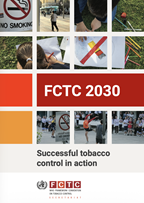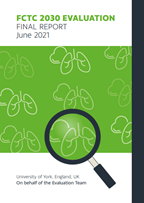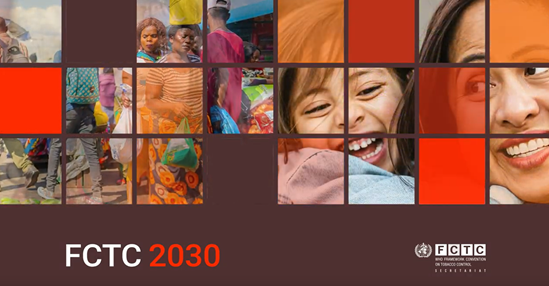.tmb-768v.png?Culture=en&sfvrsn=91da2c92_12)
FCTC 2030
Tobacco is a health and sustainable development issue. The 2030 Agenda for Sustainable Development includes a specific target focused on the implementation of the WHO Framework Convention on Tobacco Control (WHO FCTC).
In 2016, the Government of the United Kingdom initiated the FCTC 2030 project to support low- and middle-income countries in this process, and they were soon joined by the governments of Australia and Norway. Together, the governments are enabling support to countries eligible to receive official development assistance (ODA) to further their work in tobacco control and implementation of the WHO FCTC.
The project is delivered by the Convention Secretariat, in partnership with the WHO, UNDP and experts from civil society and academic organisations.
FCTC2030 Video
Brochure

FCTC 2030: Successful tobacco control in action
FCTC 2030 evaluation

FCTC 2030 evaluation final report
Support available through the FCTC 2030 project is focused on:
- implementation of tobacco control governance, in accordance with WHO FCTC Article 5;
- strengthening tobacco taxation, in accordance with WHO FCTC Article 6;
- implementation of time-bound measures, in accordance with WHO FCTC Articles 8, 11 and 13;
- implementing other articles of the Convention according to national priorities; and
- promoting treaty implementation as part of the 2030 Agenda for Sustainable Development.
FCTC 2030 Parties
Phase 1 | Phase 2 | Phase 3 | |||
| Cabo Verde | Madagascar | Armenia | Bhutan | ||
| Cambodia | Myanmar | Costa Rica | Burkina Faso | ||
| Chad | Nepal | Eswatini | Ghana | ||
| Colombia | Samoa | Fiji | Iran, Islamic Republic of | ||
| Egypt | Sierra Leone | Lao People's Democratic Republic | Mongolia | ||
| El Salvador | Sri Lanka | Mozambique | Montenegro | ||
| Georgia | Zambia | Serbia | Panama | ||
| Jordan | Suriname | United Republic of Tanzania | |||
| Tunisia | Timor-Leste |
The FCTC 2030 project is delivered with generous contributions from:

